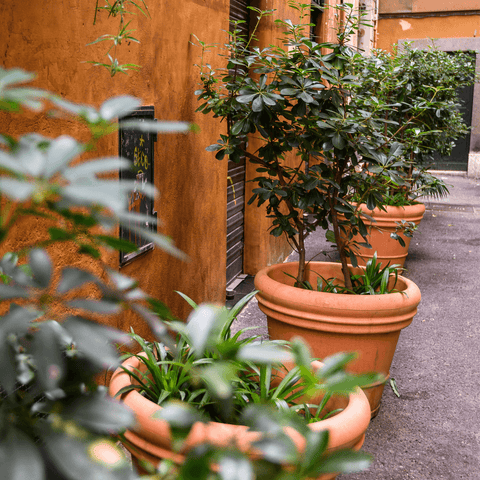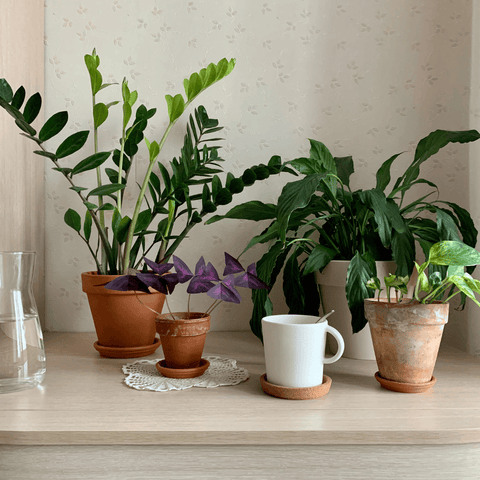Do you feel like your life could be better in something? Are you perpetually tired? Are you looking to escape the hustle and bustle of your daily life? Look no further than Plant Therapy! A growing trend, Plant Therapy is a fantastic way to nourish your mind, body, and soul. Using plants, nature, and aromatherapy, you can unlock the wonders of plant therapy.
From the physical and mental health benefits to creating a harmonious environment, plant therapy will bring life back into your home. In this article, we'll explore the wonderful world of plant therapy and the power of houseplants.
Plant Therapy is a growing trend gaining popularity over the last few years. This therapy centers around connecting with plants in practical and spiritual ways to nourish your mind, body, and soul. Houseplants are a great way to start incorporating plant therapy into your life. Caring for plants can be a rewarding and satisfying experience and a great way to relax and de-stress.
Caring for a houseplant is not difficult and doesn't require a lot of time. All plants have basic needs, such as sun and water. Sunlight is essential for any plant, so finding the right spot for your new plant is crucial. Most plants also need water, so checking the soil regularly is vital to ensure it's not too dry or too wet.
It's also important to research which plants are best suited for your home and lifestyle. For example, some plants need more light than others, and some need more water. So researching plants before you bring them into your home is vital to having a successful houseplant experience.
Plant Therapy is also about connecting with your plants. Taking time to observe and appreciate your plants can be calming and centering. When you take care of plants, it's important to remember that they are living things, and they can feel love and appreciation.
Incorporating plant therapy can be a great way to nurture your mind, body, and soul. Houseplants can provide mental and physical benefits and be a source of joy and relaxation. With some research and a little care, you can create a peaceful and healing environment in your home with houseplants.
What is Plant Therapy?
Plant therapy, also known as horticultural therapy, is an approach to mental, physical, and spiritual well-being that uses plants to support healing and growth. It recognizes the ability of plants to connect humans to the natural world while providing a way to learn, explore and develop a relationship with the environment. Plant therapy is used to treat a myriad of conditions, such as depression, anxiety, stress, and even physical ailments.
Plant therapy can take many forms. It can include growing plants indoors in pots or hydroponics, taking care of houseplants, or even participating in outdoor gardening activities. Plant therapy focuses on how contact with plants, caring for them, and just being around them can impact mental well-being. For instance, contact with plants has been shown to reduce stress and improve cognitive functions. Plant Therapy also advocates for environmental stewardship and the cultivation of a connection with nature, as researchers have identified the decrease in mental well-being that results from urbanization and lack of contact with the outdoors.
Caretaking and connecting with the plants can be a calming, meditative activity. It provides individuals with an opportunity to practice self-care and mindful awareness. Plant care can also help to cultivate patience and mindfulness, as it takes time for plants to grow and develop. It alludes to the greater idea of self-care and can also provide feelings of accomplishment and pride for those who engage in plant therapy.
Individuals might connect to something greater through their involvement with plants and develop an appreciation for the earth. As such, plant therapy can be beneficial not only on a mental and physical level but also on an emotional and spiritual level. It is a holistic approach to health and wellness and can help nourish the mind, body, and soul.
Benefits of Plant Therapy
Plant Therapy offers numerous benefits to both your mental and physical health. It can be a great way to reduce stress and anxiety and create a feeling of calm in your home. Plants are also known to boost air quality, develop a sense of connection with nature, and even improve moods. As you learn to care for plants and observe their beauty, you can reap some of plant therapy's great rewards.
By caring for a houseplant, you can get an immediate mood boost. The feeling of caring for something and watching it grow can be calming and satisfying. Through this, you will learn to accept the responsibilities and rewards of caring for your plant and can transfer these skills to other areas of life. Photosynthesis, the process by which plants consume carbon dioxide and transform it into oxygen, is also beneficial for your own health. With the right amount of plant care, you can help improve the air quality in your home while cultivating a sense of connection with nature.
Regarding mental health, studies have shown that plants can be beneficial in treating conditions such as depression and anxiety. For instance, a study conducted in 2017 found that living with plants could reduce symptoms of depression and anxiety by as much as 20%. In addition, regular contact with houseplants can help create a calming atmosphere and reduce stress levels.
Overall, plant therapy can benefit your physical and mental health. Incorporating plants into your home can reduce stress, create a calming atmosphere, and even improve air quality. Caring for plants can also be a great way to cultivate joy, relaxation, and a deeper connection with nature.
Mental Benefits of Plant Therapy
Caring for and interacting with plants offers many mental benefits. Plant therapy has been shown to increase focus, reduce stress levels, and improve mental well-being. Houseplants can even help reduce symptoms of depression and anxiety.
Plant therapy promotes mindfulness and can help reduce stress levels. People are encouraged to slow down and be present when caring for and interacting with plants. Taking the focus away from worries, plant care forces us to shift our attention and be mindful and aware of our actions, like how much water we're giving the plant and what the environment around it looks like. This mindful practice of being in the moment can decrease stress, allowing people to find inner peace and calm.
The ability to nurture and care for plants is also therapeutic. It can create a sense of accomplishment and pride while promoting feelings of self-love. In addition, plant care provides a sense of purpose, which can significantly improve mental well-being.
Furthermore, research has shown that houseplants can help improve air quality and reduce levels of toxic agents. This helps to reduce stress and promote a feeling of relaxation. In addition, oxygen-rich environments have been found to reduce symptoms of depression and anxiety. Houseplants are even known to reduce noise levels and increase creativity.
We can gain the physical and mental benefits of being close to nature through plant therapy. It is an effective way to take a break from our hectic lives and connect with our surroundings. By practicing plant care and enjoying the benefits of plant therapy, we can nourish our minds, bodies, and souls.
Physical Benefits of Plant Therapy
In recent years, more and more people have become aware of plants' many health benefits. Plant therapy, or the therapeutic use of plants, has become an increasingly popular way to nourish the mind, body, and soul. However, when it comes to physical health benefits, plants have much to offer.
Houseplants have been linked to a range of physical benefits. For example, one study found that indoor plants can improve air quality and reduce volatile organic compounds and carbon dioxide concentrations. Another study concluded that plants can reduce stress and fatigue levels and increase efficiency. Additionally, plants can boost physical and psychological health by increasing feelings of relaxation and well-being and decreasing feelings of fear, anger, and aggression.
Plants can also help your mental health. Studies have found that plants can enhance mental clarity, increase creativity, and reduce anxiety and depression. Furthermore, plants can help you to sleep better by improving your sleep quality and duration.
Regarding physical health, plants can help reduce blood pressure and stress levels and improve concentration, memory, and productivity. Studies have also shown that plants can reduce the risk of respiratory, cardiovascular, and digestive disorders.
Plants can also be beneficial for skin and hair health. Certain plants have long been used in traditional medicines to treat skin conditions like eczema and psoriasis. Additionally, plants can provide essential vitamins and minerals to promote healthy and strong hair, nails, and skin.
Finally, plants can even help to heal cuts and wounds. Studies have found that certain plants can produce compounds that can help to reduce swelling, accelerate wound closure and reduce bacterial growth.
Plant care is also a great way to relax and de-stress. Caring for plants can be an enjoyable and therapeutic activity, allowing you to connect with nature and reap the benefits of being around plants. Additionally, caring for plants can help you to become more mindful, as it requires you to focus on the present moment and stay in tune with your senses. Plant therapy is an effective and enjoyable way to nourish your mind, body, and soul. By incorporating plants into your life, you can reap the many benefits that plants have to offer.
Using Your Plants in Therapy
Plant therapy is a great way to use plants as an avenue for self-care and mental health. Your houseplants can help you cultivate a sense of calm and well-being and nurture the connection between your mind, body, and soul. Plant care is an essential part of the process — tending to your plants is an excellent way to de-stress and practice mindfulness. Taking time to check in with your plants, providing them with the right amount of sunlight and water, and watching them grow, can all help to promote a sense of satisfaction and accomplishment. Incorporating plants into your regular self-care practice can be a powerful way to nourish your mental health.
Harnessing the Power of Nature
Plant therapy, or using plants to nourish the mind, body, and soul, has become a popular way to manage stress and anxiety. With the help of houseplants, you can find peace and comfort in nature's tranquility.
When harnessing nature's power, it's important to learn how to care for houseplants properly. Plant care is essential to ensure plants are healthy and thriving. Plant care involves providing the right amount of light, water, humidity, and other environmental factors. A little knowledge goes a long way in helping you develop a successful plant care routine.
By embracing plant therapy, you can reap the mental, emotional, and physical benefits of connecting with nature. A little research and practice goes a long way in ensuring the best results for your plant and the health of your soul.
Creating a Harmonious Environment
When it comes to plant therapy, it is essential to understand that it is a two-way relationship between you and the plants. It is essential to provide care and attention to your houseplants to thrive and, in turn, help you relax and promote health. Proper plant care is necessary for any successful plant therapy experience. This includes providing appropriate sunlight, water, and soil for the plants and ensuring the temperature and humidity requirements are met. Additionally, selecting the right type of plants that are known to purify the air and fill the space with positive energies can help create a harmonious environment. Plant therapy can be a calming and rewarding experience when the right plants are chosen and adequately cared for.
Using Aromatherapy with Plants
One way to use plants to benefit your mental and physical health is through aromatherapy. Many houseplants emit pleasant aromas that can help you to relax, increase focus, and reduce stress. Some plants even have antibacterial and anti-inflammatory properties that can help boost your immune system and improve air quality in your home. When it comes to plant care, choosing plants that are suitable for your environment and giving them the right amount of sunlight, water, and nutrients is essential. By understanding which plants work best in your environment and giving them the care they need, you can reap plant therapy's full medicinal and mental benefits.
Conclusion
Plant therapy can be a powerful tool for nourishing the mind, body, and soul. By owning and caring for plants, we can tap into nature's healing power and aromatherapy's calming effects. However, plant therapy is not a one-size-fits-all approach but rather an individualized practice that can be tailored to an individual's needs and goals. Whether you want to reduce stress, improve sleep or bring a bit of nature into your life, a plant therapy option is available to suit your needs. So, get creative and start exploring the benefits plants can bring to your life today!





Comments (0)
There are no comments for this article. Be the first one to leave a message!